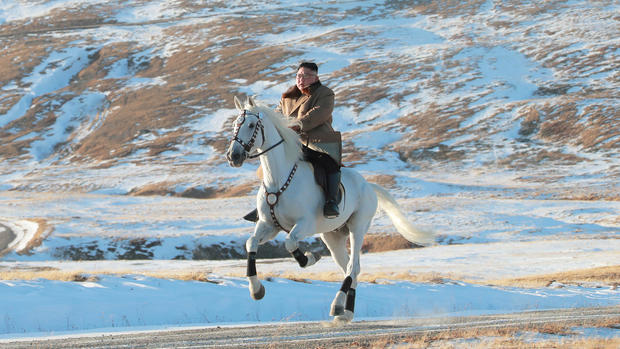Kim Jong Un clarifies his nuclear weapons stance
PYONGYANG, North Korea - North Korean leader Kim Jong Un said his country will not use its nuclear weapons first unless its sovereignty is invaded, in a speech during a critical party congress that struck a conciliatory note in the face of international pressure over its recent nuclear test and long-range rocket launch.
Kim said he is ready to improve ties with "hostile" nations, and called for more talks with rival South Korea to reduce misunderstanding and distrust between them. He also urged the United States to stay away from inter-Korean issues, according to the official Korean Central News Agency.
"Our republic is a responsible nuclear state that, as we made clear before, will not use nuclear weapons first unless aggressive hostile forces use nuclear weapons to invade on our sovereignty," Kim said in a speech carried by the KCNA.
The North's Korean Central Television on Sunday showed Kim delivering the speech at Pyongyang's April 25 House of Culture, wearing a black dress suit, a grey tie and horn-rimmed glasses that resembled the ones worn by his late grandfather and North Korean leader Kim Il Sung.
He said that North Korea "will sincerely fulfill its duties for the non-proliferation of nuclear weapons and work to realize the denuclearization of the world."
The North is ready to improve and normalize ties with countries hostile to it if they respect its sovereignty and approach it in a friendly manner, Kim said.
Despite the talks about more diplomatic activity, Kim also made it clear that the North has no plans to discard its "byongjin" policy of simultaneously developing its nuclear weapons and its domestic economy.
In a speech published by the North's Rodong Sinmun newspaper, Kim described the twin policy as a strategy the party must permanently hold on to for the "maximized interest of our revolution."
Many outside analysts consider the policy unlikely to succeed because of the heavy price North Korea pays for its nuclear program in terms of international sanctions that keep its economy from growing.
At the congress, Kim also announced a five-year plan starting this year to develop the North's dismal economy and identified improving the country's power supply and increasing its agricultural and light-manufacturing production as the critical parts of the program. He also said the country must secure more electricity through nuclear power plants, according to the state media. Jeong Joon Hee, the spokesman from the South's Unification Ministry, said that the North currently doesn't have nuclear power plants producing electricity.
Analysts have anticipated Kim would use the first Workers' Party congress in decades to propose talks with rivals to exploit what he considers to be increased leverage as a nuclear power.
North Korea carried out its fourth nuclear test in January and followed with a satellite launch in February that was seen by outside governments as a banned test for long-range missile technology, earning worldwide condemnation and tougher U.N. sanctions.
The North responded to the punitive measures, and also the annual U.S.-South Korean military drills in March and April, by firing a series of missiles and artillery into the sea. It also claimed advancements in developing nuclear weapons and long-range missiles, and combined them with threats of pre-emptive nuclear strikes on Washington and Seoul.
Analysts said that the North's belligerent stance might have been intended at rallying North Korean people around Kim ahead of the congress and also promote military accomplishments to the domestic audience to make up for the lack of tangible economic achievements to present at the party meeting.
South Korea has taken a hard-line approach to North Korea following its nuclear test and long-range rocket launch, shutting down a jointly-run factory park in a North Korean border town that had been the last remaining symbol of cooperation between the rivals and slapping Pyongyang with its own economic sanctions.
Seoul has also been in talks with Washington on deploying a sophisticated U.S. missile defense system in South Korea.
North Korea had spent the past months resisting talks with the South and threatening attacks against it, but Kim spoke with a different tone at the conference. He said "fundamentally improving" inter-Korean relations was an urgent matter for his government and also called for the South to "hold hands" with the North as a "companion" for unification, the KCNA said.
He urged the need for more talks with the South, and in particular called for a meeting between military officials of both sides to reduce border tension.
However, Kim stressed that the South must first employ practical measures to improve ties and throw out laws and institutional systems that have hampered them. He also said that the United States should no longer be involved with matters in the Korean Peninsula, and that if enemy forces "ignite the fire of war," the North was ready to mercilessly punish the aggressors and accomplish the "historical feat" of unification.
Kim called for Seoul and Washington to stop their military drills and also said the United States must withdraw the 28,500 troops stationed in South Korea as a buffer against possible aggression from the North.
South Korea's Foreign Ministry said ahead of the North's ruling party congress in Pyongyang that the priority of any future talks with the North would be its denuclearization.
